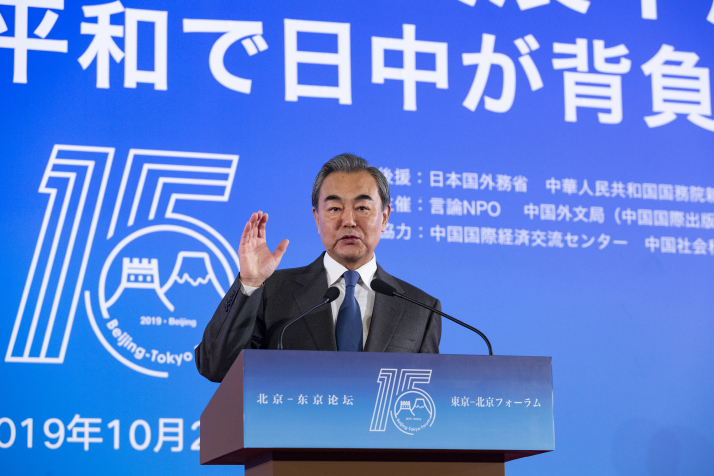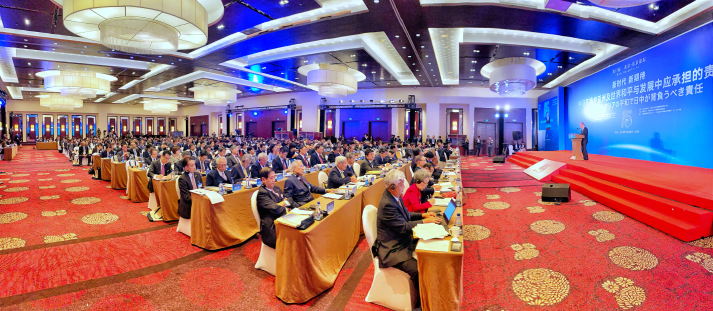| World |
| Continuing to Warm Up | |
| The new era calls on China and Japan to forge more mature and stable relations | |
|
|
 Chinese State Councilor and Foreign Minister Wang Yi addresses the opening ceremony of the 15th Tokyo-Beijing Forum in Beijing on October 26 (CHEN JIAN)
Two years after the normalization of bilateral ties, China and Japan signed an agreement on civil aviation in 1974, which has led today to 1,000 direct flights between the two neighbors per week. In addition, China has ranked No.1 among the major sources of tourists to Japan since 2015, with 9.06 million visits in 2018, as Chinese tourists have become the most lavish visitors in Japan. These are all signs of a thaw in the bilateral relations that hit a low point several years ago due to their territorial disputes and Japan's revisionist attitude toward its past war crimes. China-Japan relations have undergone important and positive changes. Against this promising backdrop, the 15th Beijing-Tokyo Forum, co-organized by the China International Publishing Group and the non-profit Japanese think tank Genron NPO, was held in Beijing on October 26-27. More than 500 guests from political, business, academic and media circles from the two countries held discussions on bilateral relations, political mutual trust and other major issues. Closer ties A recent poll showed that more Chinese people are optimistic about China-Japan relations, expecting the two sides to deepen economic cooperation and people-to-people exchanges. According to the survey, 67 percent of Chinese respondents believed that the relationship between the two sides was important or comparatively important. Meanwhile, 72.7 percent of Japanese respondents said they regarded bilateral relations as important. During the Group of 20 Osaka Summit this summer, Chinese President Xi Jinping met with Japanese Prime Minister Shinzo Abe, and important consensus was reached on key issues, injecting a new impetus into bilateral relations. Xi has also accepted in principle Abe's invitation for a state visit to Japan during the cherry blossom season next year, which would be the first official visit to Japan by a Chinese head of state in 12 years. The interests of the two countries have never been so widely and deeply integrated, while the development of the two countries has never been so directly and closely linked, said Wang Yi, Chinese State Councilor and Foreign Minister, in his address at the opening ceremony of the 15th Beijing-Tokyo Forum on October 26. In the new era, China and Japan have vast opportunities for extensive and in-depth collaboration, such as maintaining security in East Asia, advocating multilateralism, upholding the international trading system and jointly coping with natural disasters and an aging society, Shigeki Sato, former Vice Minister of Health, Labor and Welfare of Japan, said at the forum. Both governments and civil society should seize these openings and make strides, he said. Liu Hongcai, Vice President of the China Association for International Understanding, said as two of the world's major economies, China and Japan should work together to provide more public goods for the international community and make due contributions to the peace and development of the region and the world at large. Echoing Sato and Liu's views, former Japanese Minister for Foreign Affairs Yoriko Kawaguchi added that the two sides should take advantage of the rare opportunities presented and remove obstacles in the way of cooperation through enhanced communication. Survey respondents from both sides also noted their expectations for strengthening international cooperation, with 63.5 percent of Japanese respondents in favor of joint efforts on regional affairs. Wang stressed that the two countries should respond more positively to the expectations of the countries in the region, accelerate negotiations on the Regional Comprehensive Economic Partnership and the China-Japan-Republic of Korea (ROK) Free Trade Area, and lead the process of regional cooperation and integration in Asia. According to the survey, 60.8 percent of Chinese respondents believed the two countries enjoy strong economic complementarity and 59.3 percent expected trade volume to increase significantly or at least moderately in the future. With the signing of the Memorandum on China-Japan Cooperation in the Third-Party Market last year, the two countries have achieved rebounding trade volume. In 2018, bilateral trade exceeded $300 billion. Jun Ohta, CEO of Japan's Sumitomo Mitsui Financial Group, which has carried out several projects in third-party markets with Chinese partners, said that since there are increasing projects with Chinese enterprises and financial institutions in this field, bilateral cooperation will become even more important. However, he also expressed his concerns about differences between China and Japan over how to boost projects and evaluate risks. The two sides should strengthen exchanges to reach more consensus, he said. Vice President of the Huawei Global Government Affairs Department Zhou Mingcheng used an example to show how closely the two countries' supply chains are connected, saying that in the latest Huawei phones, 53.2 percent of the components come from Japan. "In the first three quarters of the year, Huawei's purchases in Japan have exceeded the total of last year, climbing to 787.4 billion yen ($7.23 billion)," he said. There is vast potential in the digital and financial fields, where the two sides can develop products and go global through joint efforts, Zhou added. Li Xiao, a professor at Jilin University, agreed with Zhou. Being the second and third largest economies in the world, the two countries still have a lot to explore in economic cooperation, he said.  Delegates from China and Japan attend the 15th Beijing-Tokyo Forum in Beijing on October 26 (CHEN JIAN)
Building mutual trust More respondents from both countries believed that enhancing mutual trust was the most effective way to further strengthen bilateral relations. Among Chinese respondents, 38.7 percent wanted more political trust, up 12.7 percentage points from 2018. And among the Japanese, the number was 43.6 percent, up 4.5 percentage points from the previous year. In August, China and Japan resumed a new round of strategic dialogue after a seven-year hiatus, which was a manifestation of the growing political mutual trust and the relatively stable public attitude toward such sensitive issues as history, territory and security. According to Yasushi Akashi, former United Nations Under Secretary General for Humanitarian Affairs and Emergency Relief Coordinator, the two countries have complex historical and territorial issues to be resolved, but there are more common interests in broader areas. Both sides need to build political trust and use their wisdom to find ways to live in harmony on the path to achieving their respective dreams. In order to enhance political trust, Wang urged Japan to keep its promise of correctly dealing with issues of major concern to the Chinese people, particularly regarding history and Taiwan, by strictly adhering to the one-China principle and respecting China's position on historical events. The mistrust between the two peoples should be dispelled jointly since some Japanese people may still regard China's peaceful rise as a threat, Kawaguchi said, adding that it's important for Japanese to get to know China better with their own eyes and experiences. "What I expect from China is that it will fully present itself and conduct candid dialogue with the Japanese side," she added. China and Japan should build a more constructive security relationship as well. The two sides established a maritime and air liaison mechanism in 2018 to jointly manage and control maritime crises and turn the East China Sea into a sea of peace, cooperation and friendship. According to the Beijing Consensus adopted by the forum, the two should continue to discuss various ways to eliminate and prevent crises and risks. In the future, the two sides need to enhance mutual trust in security, replace suspicion and precautions with dialogue and exchanges, strengthen weak areas in security and overcome security difficulties, Wang added. Copyedited by Rebeca Toledo Comments to mamm@bjreview.com |
|
||||||||||||||||||||||||||||||
|
